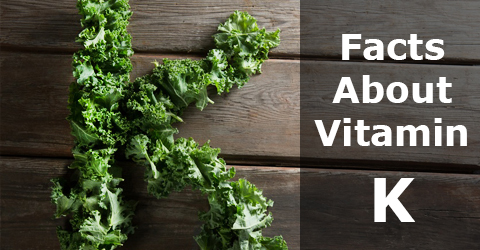

Vitamin K is a crucial and sometimes forgotten nutrient. Just like vitamins A, D, and E, vitamin K is a fat soluble vitamin.
There are two types of vitamin K: K1 (phylloquinone) and K2 (menaquinone, of which there are actually several types). Vitamin K1 is most important for regulation of blood clotting, while vitamin K2 helps activate proteins and is more important for bone health and for preventing cancer, diabetes, and heart disease.
Sources of Vitamin K1
Major sources of vitamin K1 include leafy green vegetables (e.g. kale, spinach, collard greens, Swiss chard, turnip greens, mustard greens, parsley, romaine lettuce) and cruciferous vegetables (Brussels sprouts, broccoli, cabbage). Asparagus, bok choy, peas, parsley and lentils, as well as some fruits such as prunes, grapes, raspberries, and especially blueberries also contain high amounts of K1.
Sources of Vitamin K2
Vitamin K2 is made by bacteria and found in small amounts in some fermented foods and animal products. There are very few plant-based sources. The exception is foods fermented with those K2 producing bacteria. Natto, a fermented soy product, contains the greatest amount. Other plant-based sources include sauerkraut, tempeh, and kombucha, but their K2 content is inconsistent and will depend on the method of production. Some studies show that K2 is made by human intestinal flora.[1] Additionally, gut bacteria have the ability to convert vitamin K1 into K2. For example, one study demonstrated that when breastfeeding mothers were supplemented with vitamin K1, vitamin K2 was produced.[2]
There is some evidence that vitamin K2 consumption is associated with less heart disease and prostate cancer.
The Dietary Reference Intake for vitamin K is 120 micrograms (µg) for men and 90µg for women. A single half cup serving of broccoli contains this amount, whereas spinach and kale contain 3.5 to 5 times this amount. Despite low intakes of fresh vegetables on a national level, most people within the United States consume adequate vitamin K.[3] There is no adverse effect from eating too much vitamin K. However, if you take medication that affects blood clotting (e.g. Warfarin/Coumadin), talk to your doctor, as vitamin K can interfere with its efficiency. Finally, vitamin K is a fat-soluble vitamin, and dietary fat can significantly increase its absorption from food.[4] Most sources of vitamin K contain little or no fat, and therefore adding some fat (e.g. from seeds or nuts) to meals containing vitamin K rich foods can help increase absorption.
There is some evidence that vitamin K2 consumption is associated with less heart disease[5-7] and prostate cancer.[8] Other evidence suggests that vitamin K2 supplementation may be beneficial for heart health,[9] improving insulin sensitivity,[10] and bone health.[11],[12] However, there is no evidence that vitamin K2 supplementation is beneficial in the context of a whole food, plant-based diet containing lots of fresh fruits and vegetables. For example, those eating plant-based diets do not have slow blood clotting times compared to omnivores.[13],[14] At the same time, it appears that excess vitamin K2 supplementation may have side effects.[12]
Symptoms of Vitamin K Deficiency
Unless a person has had repeated courses of strong antibiotics or has severe liver or digestive tract issues, gut bacteria should provide plenty of vitamin K2. Because vitamin K1 is found in large amounts in many foods, vitamin K deficiency is very rare[15] and usually only develops in severe liver disease or malabsorption syndromes (e.g. caused by digestive tract diseases or certain medications). Symptoms of insufficient vitamin K include easy bruising and bleeding (e.g. bloody urine/stools, nosebleeds) as well as difficult menstruation. To check if you have sufficient vitamin K, ask your physician to check your prothrombin time. It is also possible to directly measure the amount of vitamin K from a blood test, but this can be expensive and is not routinely offered.
To conclude, a whole food, plant-based diet will provide large amounts of vitamin K and keep your gut healthy for optimal vitamin K2 synthesis and total vitamin K absorption.
Vitamin K1 is important for regulation of blood clotting
Sources high in K1 include leafy green and cruciferous vegetables, lentils, and some fruits e.g. blueberries
Vitamin K2 helps activate proteins and is important for bone health and disease prevention
Plant-based sources of K2 include natto, sauerkraut, tempeh, and kombucha
Vitamin K can interfere with the efficiency of blood clotting medications
Symptoms of vitamin K deficiency include easy bruising and bleeding
Copyright 2024 Center for Nutrition Studies. All rights reserved.